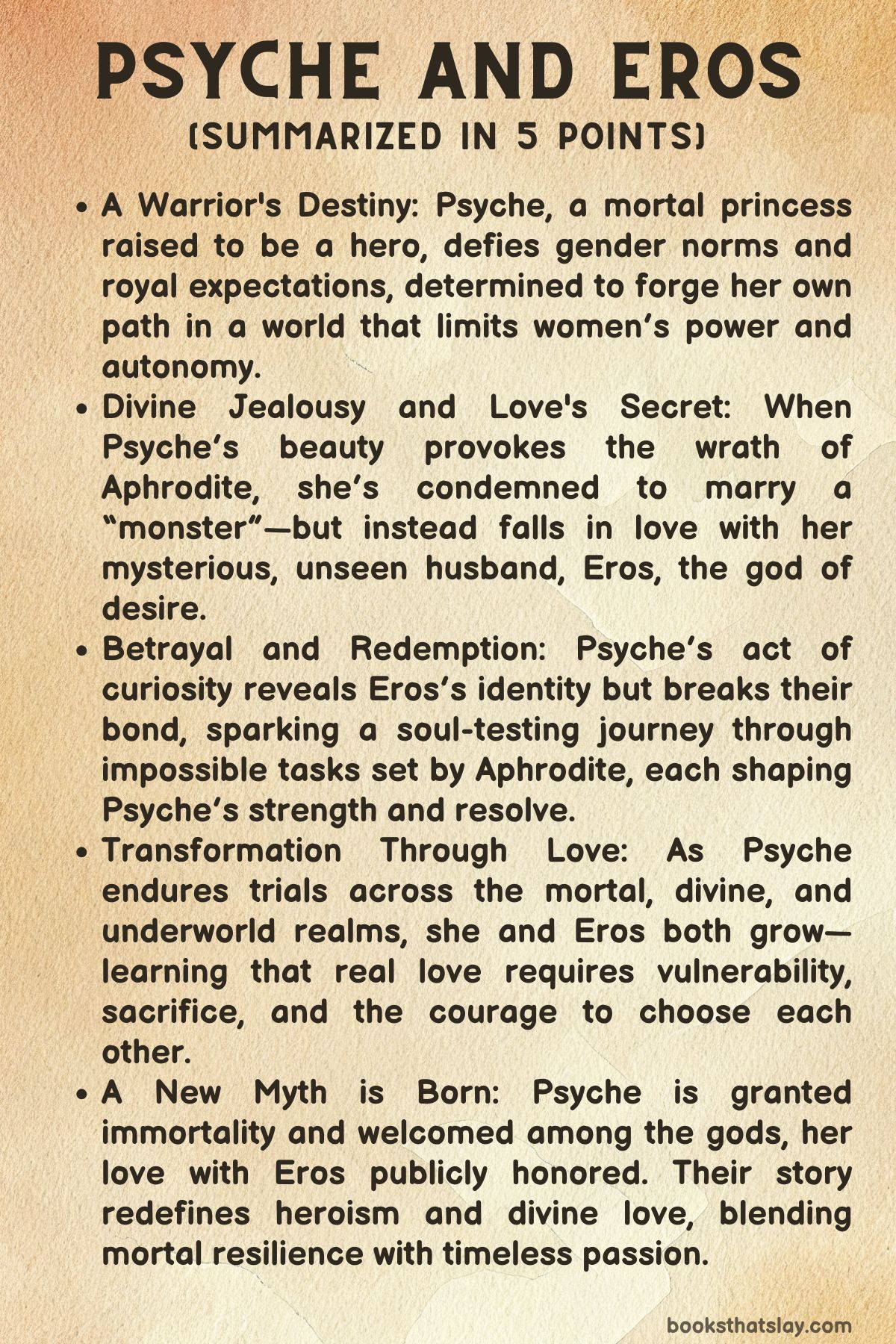Psyche and Eros Summary, Characters and Themes
Psyche and Eros by Luna McNamara is a feminist retelling of the classic Greek myth, reimagined through the lens of modern sensibilities and ancient magic.
In Luna McNamara’s lyrical debut, the story centers on Psyche, a mortal girl trained as a warrior in defiance of gender roles, and Eros, the god of love, disillusioned with both humanity and the divine. When their worlds collide through a cruel twist of fate orchestrated by jealous gods, they are pulled into a journey of love, sacrifice, and transformation. This novel explores the power of choice, the courage to defy destiny, and what it means to love with one’s whole soul.
Summary
Psyche and Eros opens with two parallel storylines: one of Psyche, a mortal princess raised to be a warrior in Mycenae, and the other of Eros, the god of desire, living in exile after centuries of disillusionment with love and divine politics.
Psyche is born under a prophecy that marks her for greatness, and her father, refusing to let her be bound by traditional gender roles, trains her as a hero.
Meanwhile, Eros—once a powerful primordial force—has grown tired of watching gods and mortals alike be ruined by obsession and desire. He lives in solitude, hiding from his adoptive mother, Aphrodite, who uses him as a pawn in divine manipulations.
As Psyche grows older, her beauty begins to attract unwelcome attention. While she wants to be seen as a warrior and scholar, society—and especially the gods—see her only as a mortal rival to Aphrodite.
When people start worshipping her as more beautiful than the goddess of love herself, Aphrodite becomes enraged. She commands Eros to punish Psyche by making her fall in love with a monster.
However, when Eros sees Psyche for the first time, he is struck—not by his own arrow, but by a genuine connection. Instead of cursing her, he becomes her secret, unseen husband.
Psyche, led by a prophecy, is taken to a mysterious palace where she is cared for by invisible servants and visited each night by a loving, faceless man—Eros in disguise. Though she begins to fall for him, doubt creeps in.
Her jealous sisters plant suspicion in her mind, warning that her unseen husband could be a monster. Driven by fear, Psyche lights a lamp to see his face and is stunned by his beauty—but the act betrays his trust. Burned by the lamp’s oil, Eros flees.
Heartbroken, Psyche sets out to win him back. She undergoes a series of impossible tasks given by Aphrodite: sorting grains, collecting golden fleece, drawing water from the River Styx, and journeying to the Underworld to retrieve beauty from Persephone.
With the help of gods and animals, and her own cleverness and resilience, she succeeds—until she opens the box of beauty, hoping to be enough for Eros. It contains a deathlike sleep that overwhelms her.
Eros, defying Aphrodite and risking divine wrath, finds Psyche’s lifeless body and revives her with a kiss.
But love alone isn’t enough—they must now confront Olympus. Psyche, no longer a passive mortal but a battle-hardened heroine, walks into the gods’ court as an equal. She undergoes one final symbolic trial: to face her entire life, her fears and failures, and emerge whole. She succeeds, proving her strength of soul.
Moved by her courage, Zeus grants Psyche immortality. She drinks ambrosia and becomes a goddess, formally uniting with Eros.
The gods bear witness to their divine marriage, and Psyche is honored not as a beauty to be possessed, but as a symbol of transformative love. Eros, too, is changed: he takes up his bow again, this time to nurture connections rather than manipulate them.
Together, they become guardians of love—equal partners, shaping hearts with empathy, passion, and choice. Psyche’s story becomes legend, not as a cautionary tale of disobedience, but a myth of courage, love, and the power to change even fate itself.

Characters
Psyche
Psyche, the protagonist of the novel, is a mortal princess whose journey from being a humble, uncertain girl to a powerful goddess embodies transformation and self-discovery. From the early chapters, it’s clear that she is not just a beauty to be admired but a force to be reckoned with.
Her early training as a warrior under her father and Atalanta gives her strength, resilience, and a sense of independence. However, it is her internal journey that truly defines her.
Psyche is constantly challenged by societal expectations, both as a woman and as a royal figure. She faces the pressure to conform to roles defined by others, particularly the patriarchal world around her, which expects her to marry and give up her aspirations of heroism.
Her eventual journey into the world of the gods, especially after being betrayed by her curiosity and the consequences of seeing her husband Eros’s true form, shows her growth. Through the trials set by Aphrodite, Psyche learns not only to survive but to thrive.
She proves her courage, resourcefulness, and ultimate devotion to love. By the end, Psyche has undergone a complete transformation, from a mortal to an immortal, bridging the gap between the divine and human realms.
Her story is one of resilience, challenging fate, and redefining the narrative of womanhood and heroism.
Eros
Eros, the god of desire, is initially depicted as a disillusioned figure, estranged from divine politics and the corruption of love among the gods. His background, steeped in bitterness and detachment, reveals a complex character who desires intimacy but is reluctant to engage in it due to his past disillusionments.
His love for Psyche, however, reveals another side of him—one that is vulnerable, conflicted, and full of longing. Throughout the novel, Eros is caught between his divine duties, especially to his mother Aphrodite, and his deep, genuine affection for Psyche.
His relationship with her is marked by secrecy and guilt, as he is unable to reveal himself to her for fear of divine retribution. Eros’s internal conflict becomes a central theme in his character arc.
Despite his power and status as a god, his emotional vulnerabilities come to the forefront, especially after Psyche’s betrayal when she tries to see his face. This betrayal wounds him deeply, and he retreats into isolation, but it also leads to growth.
As the story progresses, Eros shifts from being a figure of manipulation and power to one of compassion and understanding. His love for Psyche teaches him that love is not just about desire but also about choice, trust, and sacrifice.
In the end, Eros not only reconciles with Psyche but defies the divine order to be with her, making a powerful statement about love’s transcendence over divine politics.
Aphrodite
Aphrodite, the goddess of love and beauty, plays the role of an antagonist in the story, driven by jealousy and insecurity. While her beauty and influence are unquestionable, she represents a flawed and oppressive form of love—one that seeks to control, manipulate, and dominate.
Her conflict with Psyche begins when the mortal princess’s beauty is said to surpass that of the goddess, sparking Aphrodite’s wrath. Aphrodite’s reaction is not just about vanity but also about her need to assert her superiority over others, including her son, Eros.
Throughout the novel, Aphrodite sets cruel and impossible tasks for Psyche, hoping to break her spirit and prove her superiority. Despite her initial portrayal as a villain, Aphrodite’s character is more complex.
She represents the darker side of love, one that is self-serving and destructive, but also a form of love that, in her own way, desires validation and dominance. Ultimately, it is her refusal to accept Psyche’s autonomy and strength that highlights her character’s limitations, contrasting with Psyche’s growth and eventual transcendence.
Zeus and Other Gods
Zeus, the king of the gods, plays a pivotal role in the resolution of the conflict between Psyche and Eros. His character evolves from a distant figure to one who questions the divine order and the limitations of power.
In the end, Zeus is moved by Psyche’s trials and recognizes her worth, offering her immortality. His role in the narrative shifts from a mere figure of authority to one who represents wisdom and the possibility of change within the divine hierarchy.
Other gods, like Hera, also play crucial roles in Psyche’s final trial and eventual elevation to goddess status. Their shift in allegiance, from supporting Aphrodite to recognizing Psyche’s strength and worth, symbolizes the changing tides of divine politics and the growing recognition of Psyche’s heroic nature.
These gods, while often distant and indifferent to mortal struggles, gradually begin to see Psyche not as a threat but as an essential part of the divine balance. Their involvement in the story reinforces the theme of transformation, not just for the mortals but for the gods themselves.
Themes
Divine Politics and Power Struggles
The novel explores the intricate and complex world of divine politics, where power, influence, and control are constantly at play. This theme is evident in Eros’s experiences as he navigates the tensions between his own desires and the demands of the gods.
Throughout the novel, Eros is depicted as a god who seeks solitude and distance from the often corrupt and power-driven world of the other deities. His initial withdrawal from the divine squabbles underscores the tension between personal autonomy and divine obligation.
Despite his disillusionment with the gods, he is ultimately manipulated by Aphrodite, who seeks to use him as a pawn in her games of love and vengeance. This dynamic between Eros and the gods reveals the inherent instability within the divine hierarchy, where loyalty is a currency and personal desires are often sacrificed for the greater good of the celestial order.
As Eros becomes more entangled in the affairs of gods and mortals alike, his internal conflict between love and duty illustrates the cost of power and the price one must pay to challenge the established order.
Intersection of Heroism, Identity, and Gender Expectations
The narrative delves deeply into the theme of heroism, especially in the context of Psyche’s personal journey. Raised to be a warrior, Psyche’s early training and the influence of strong female mentors like Atalanta reflect a subversion of traditional gender roles.
Her heroism, however, is not without its complications, as she must constantly wrestle with societal expectations that seek to confine her to a more passive, ornamental role due to her beauty. The pressure to conform to these expectations clashes with her desire to carve out an identity that aligns with her inner strength and aspirations.
As the novel progresses, Psyche’s journey shifts from one of self-discovery to a struggle for self-authenticity. Her resistance to the idea that women’s value lies solely in their beauty is a crucial part of her transformation, highlighting how external forces, such as the expectations of men and the gods, try to limit her potential.
This intersection of heroism and gender roles is also seen in her relationship with Eros, as both must navigate their identities within the constraints of their respective worlds—one mortal, one divine—ultimately forging a new path forward where their individualities are not defined by others.
The Nature of Love as a Transformative Force Beyond Desire
At the heart of Psyche and Eros is a profound exploration of love as a transformative and redemptive force, one that transcends mere physical desire or romantic longing. Initially, the relationship between Psyche and Eros appears to be defined by the god’s infatuation with her beauty and the intense attraction they share.
However, as their story unfolds, love evolves into something much more profound and layered. Love becomes a tool of healing, testing, and ultimately, personal growth for both characters.
Psyche’s journey through the trials set by Aphrodite—each task representing an obstacle to love, such as the sorting of grains or the retrieval of beauty from the Underworld—serves as a metaphor for the hardships love often entails. These trials reveal that love, especially the love between Psyche and Eros, is not a passive feeling but an active, sometimes painful process of self-sacrifice, growth, and mutual support.
As they face the challenges that threaten to tear them apart, the bond they share becomes stronger and more resilient. Ultimately, their love transcends the initial desires of their hearts and becomes a force for mutual healing and transformation.
The Metamorphosis of the Self and the Journey Toward Personal Redemption
Psyche’s journey is also one of profound self-transformation, where her experiences of loss, love, betrayal, and perseverance catalyze her metamorphosis from a mortal princess to a goddess. This theme of metamorphosis is central to the narrative, symbolizing the potential for personal redemption and the capacity to evolve through one’s trials.
Psyche’s descent into the Underworld and her subsequent rebirth mirror the psychological process of facing one’s deepest fears and emerging stronger for it. In her quest to reunite with Eros, she undergoes a series of transformations that force her to confront not just external obstacles but also her inner doubts and insecurities.
This journey culminates in her final trial—walking through a realm of memories and facing her own past—which represents the ultimate test of her identity. Upon overcoming this trial, she is reborn as a goddess, signifying that true transformation arises not just from external success but from a profound understanding and acceptance of oneself.
Eros, too, undergoes a transformation, as his relationship with Psyche teaches him to view love through a lens of compassion, vulnerability, and mutual respect, thereby redeeming himself from the earlier manipulative nature of his godly powers.
The Intersection of Fate, Free Will, and Divine Intervention
Throughout the novel, the tension between fate and free will is explored through the characters’ interactions with the gods and their own decisions. Psyche’s life is initially governed by the prophecy she cannot escape, a fate that seems to dictate her future in ways beyond her control.
However, as she embarks on her journey, she begins to assert her free will, making choices that directly challenge the narrative imposed upon her by divine forces. This theme is particularly evident when Psyche refuses to passively accept her fate as the bride of a monstrous god and instead takes agency over her destiny.
Similarly, Eros’s internal conflict between following his duty to Aphrodite and pursuing his own desires reflects the tension between the divine order and individual autonomy. The gods, with their manipulative schemes and capricious nature, serve as both the instigators and the barriers to the protagonists’ happiness.
Yet, despite the overwhelming influence of fate, both Psyche and Eros manage to rewrite their destinies by embracing the transformative power of love, demonstrating that while fate may shape their paths, it is their choices that define their futures.


